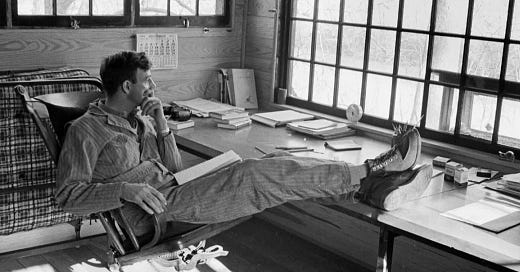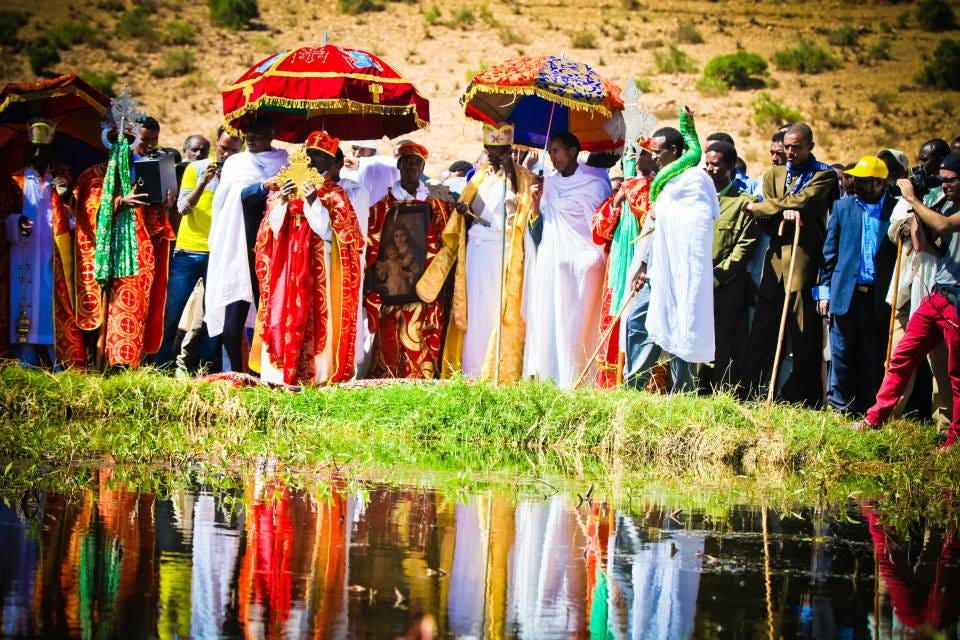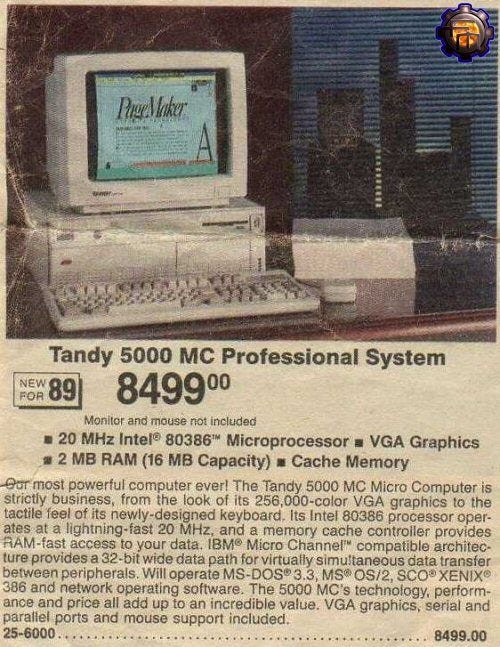How Would Wendell Berry Choose the Next Prime Minister of Canada?
Before you vote this April, read what an old farmer can teach us about how to pick a Prime Minister.
A NOTE TO YOU, THE READER:
This is the 200th essay and marks one full year of writing consistently for The Bee. I didn’t set out to write this much, or this often—but the world kept buzzing, and I kept hearing the signal. So this past year, writing kind of replaced reading hours for me.
THE BEE hive keeps growing in astonishing ways, especially given the premise—and the occasional peculiarity—of the content.
"The reader is not a passive consumer but an active participant in the creation of meaning."
— Umberto Eco
Everything written is a kind of performance and done in the service of an audience. Often unknown. Sometimes unimagined. It’s the thinking reader who brings stories to life.
THE BEE is now read by nearly 30,000 each month, and the paid subscriber base is making modest sense of this writing business’s time and effort.
Thank you for reading, replying, sharing, and disagreeing thoughtfully. You've made this a thing.
This particular essay is about that very idea: gatherings. What they meant in ancient times, what they mean now, and how politics—at its best—is just people showing up and making decisions together. It’s also a guide of sorts, drawn from the experience of an old farmer buying a computer, on how to get informed—not outraged, not hypnotized, but actually informed—so you can be a useful part of the next gathering, whether that’s a town hall, a family dinner, or a federal election.
Because democracy isn’t something you just “believe in.” It’s something we actively do. Together.

Imagine the greatest gathering of people you’ve ever attended. What was said? What was done? What was accomplished?
In olden times, especially in Norse and Germanic cultures, a political gathering was called a thing—from the Old Norse þing, meaning an assembly. These were not vague hangouts or abstract concepts; they were real, scheduled events where free people gathered to discuss laws, settle disputes, and decide matters of common concern. The Icelandic Althing, founded in 930 AD, is one of the oldest surviving examples. Ironically, the word still lingers today in our casual speech—“I have a thing”—as if we’re still attending the ancient rites of community and decision-making, just without the longboats. At its core, a thing reminds us that human progress doesn’t happen in isolation. We need to gather, to argue, to agree, to witness each other in the flesh. A society that stops showing up in person for things starts to forget what it means to belong.
I’ve been lucky enough to attend a few things. And sometimes adventure just takes the driver’s seat.
On the night of February 8th, 2008, I was playing music downtown in Halifax. After packing up the gear and saying goodnight to everyone, I headed to the truck. It was one of those warm, misty, mild nights we can get in February.
When I started the engine the radio came on with a news report that mentioned Barack Obama, who had just won the Democratic caucus in Nebraska and the primary in Louisiana, was going to be in Bangor the next day, or really later that day because it was well after midnight, giving a speech at the Bangor Arena.
Like most people, I heard Obama’s speech four years before at the DNC in Boston. I was moved. I’ve always been a believer in American Exceptionalism, and he was the perfect case study for me. Through university travels, I’d been lucky enough to meet more than a few of these exceptional Americans. The full citizen. The engaged republican (small r). The participating American. Part of what I’ll call the contributing class.
As I was driving home, I was feeling good from the gig, and kind of amped up about politics. You know what… We should go.
Pulling the kind of thing that probably contributed to divorce, I rolled in, woke everyone up, and told them we were going to pack the truck and drive to Bangor to hear a speech. A seven-hour drive, and we had 8 hours to get there. No problem.
If you have a family, you can imagine the pushback I got waking up a 10 and 12-year-old at 2 am and telling them to get their blankets, and clothes, and get in the car. Not to mention the 40-year-old, who was not… as enthusiastic about such things as I was.
Anyway, we rallied, and we got there in time. But what I didn’t anticipate was the crowd. The old auditorium had a capacity of 7,000, but over ten thousand showed up. And it seemed like all of them before us, waiting for the doors to open and Obama to arrive.
I don’t even remember the border crossing. But I remember standing in the line with thousands of active, engaged, and enthusiastic Americans. The strangest thing about it all was how NOT strange they thought it was that we drove all night from Canada to be part of this. Of course we did! Who wouldn’t? It’s both awesome and important!
So we talked to all our American neighbours in the shadow of the big Paul Bunyan statue and generally had a good time without any real plan on how this would wrap.
Would we get in when the doors opened? Should we get in? Is just being here in the crowd the important part? Because it’s America, we got to talk all this through in detail, along with open discussion of our political and spiritual beliefs right there in the field. And the kids did not have the option of being kids. The Americans were very American about all this and wanted… insisted… to hear from the kids as much as the adults about their ideas, opinions, and beliefs.
Still, we were ten thousand people back in a line that was only going to get 7,000 people in.
Then something amazing happened. A group of organizers came along with their lanyards, walkie-talkies, and clipboards. “Are you the people who came from Canada?” They were commanding but cordial with a genial authority. Apparently, our story had spread around, and we were not just welcomed in but given front row bench seats ahead of the doors opening for the crowd. From what I could understand of their thinking, they imagined us visiting dignitaries from the north, come, as people do on such august occasions, to bear witness to a great happening. And I guess — certainly in hindsight — we were.
Jack was ten, and the only other big event he had ever attended was the Ozzy concert I had taken him to a few months before. “Papa”, he yelled as the crowd swelled and buzzed around us, “This is bigger than Ozzy!” And it was. Louder too.
I’ve seen a couple of clips from the event, both inside the arena and outside, but like a great live concert, they can’t capture the emotion and enthusiasm of the event.
So we sat and waited. Inside the arena, we all thought Obama was an hour late. He wasn’t, he was right on time. But rather than disappoint the folks left outside, he spent an hour with them standing out in the field, talking and answering questions close up and personal. All those people who thought they were left out actually got the best seats, er, field, in the house. Thousands of memories of meeting and talking to the future president must have been made out in that field that day.
Though all the energy might not be captured from what it was in the arena in this YouTube clip, you can get a sense of it by reading the comments from people who were there. It was, for many, one of the great gathering moments of their lives. And it certainly was for my family. Whatever bleariness from a night downtown and then an all-night drive was wiped away by the excitement. And in truth, at that point in life, a night of music followed by an all-night drive was not that unusual.
For me, the most memorable moment came at the end. Obama had finished a truly signature speech — even his detractors would allow he is among the top orators of the age — and he opened the floor to questions. A woman sitting near us asked plaintively, “What can I do?”. I actually cringed a little because the hour was getting late, and I knew it would be pretty easy for Obama to just shuck and say “Get out there and vote.” But he didn’t. He stood and thought for what seemed an awful long time. He walked over near us and said, “What you need to do is get informed.” And he went on to explain, not just to the woman and us, but to everyone there open and listening to every word, what he meant and how he believed it could and should be done.
He challenged Americans to rise to the full weight of citizenship — to get informed, get serious, and take responsibility for shaping the future, not just observing it. You can see this in all his speeches and books, he urged people to wrestle with complexity, to absorb competing perspectives, to question easy answers, and then, having done the work, to decide what must be done. Not what someone else should do. What you must do. To him, citizenship was the top job in a democracy — and like any real job, it demanded your time, your mind, and your courage.
And he said all this in a way that Jack and Emily, at 10 and 12, could hear and understand just as easily as anyone.
Imagine the greatest gathering of people you’ve ever attended. What was said? What was done? What was accomplished? This was mine. So far.
How to choose
As this historic election in Canada draws closer, this all got me thinking about what I was really looking for in a politician, in a leader, in a new Prime Minister today. I’ve written a lot about the job descriptions of Mayors, Premiers, and Prime Ministers, pressing the point that they are not the boss of the city, province, and country. The job is more complex. There’s both less and more to it than being the boss. On one level, they are figureheads — cutting ribbons, riding floats, celebrating occasions on our behalf. On another, they are our representatives: they represent us at meetings, events, and even in international affairs. They represent our interests and ideas. And they represent our hope, vision, and goals for the future.
I know many were so cross at Mr. Trudeau over the last while. But he has never for a minute stopped being what we had hired him to be — someone who represented a connection to the best of the past and our hope for a youthful, positive, optimistic… sunny… future. That’s the deal we had. It’s not really his problem that after a while we changed our minds. We wanted to speak to the manager. We wanted someone to be responsible in a new way.
What we want from time to time changes. But what are the qualities we will always want from our leaders, especially our Prime Minister? A big part of getting informed is not just being aware of the issues of the day but understanding how government works, how roles and responsibilities are divided, and what we should expect from government. One thing is true of all groups: they will do what we let them get away with. We have to have expectations.
How do we set expectations?
It’s not good enough to simply pick the most likeable, most popular, tallest, or most handsome — though that is almost invariably what we do. Nor, counter-intuitively, is it sufficient to just pick the smartest or most experienced. The world is an astonishingly complex place, and the affairs of economics and human behavior are perhaps even more complex. Unintended consequences are the rule, not the exception, in complex systems.
So how do we decide?
RELATED:
Can Your Candidate Handle the Job?
How We Can Avoid Nonleader Candidates Like the Turtle, Bureaucrat, Screamer, and Idealist?
I’ve come around to think this through a couple times over the last year, but here’s my latest notion.
In the 1980’s a Kentucky poet, economist, writer, farmer named Wendell Berry scratched out all he wrote longhand on pads of paper and then got his wife to act as editor, typing out finished manuscripts on their old Royal typewriter that they had purchased new in the 1950’s and is probably still sitting somewhere today in perfectly serviceable condition as these machines often are.
Someone, maybe a publisher, suggested in 1987 that given the volume and worth of his work, he should consider getting a computer. Now, Berry may be among the most thoughtful intellectuals of the modern era. He thought this over deeply and decided not to get a computer but to write an essay, one of his most famous, Why I am not going to buy a computer.
To shape his decision, he made a list of nine things a new tool, technology, or technique should do - attributes it should have. I love the idea that his list had nine items - the true number of his thoughts, in an age that even then would have been well familiar with the trope of the top ten list. That’s a testament to how straight this guy shoots. He wrote:
1 The new tool should be cheaper than the one it replaces.
2 It should be at least as small in scale as the one it replaces.
3 It should do work that is clearly and demonstrably better than the one it replaces.
4 It should use less energy than the one it replaces.
5 If possible, it should use some form of solar energy, such as that of the body.
6 It should be repairable by a person of ordinary intelligence, provided that he or she has the necessary tools.
7 It should be purchasable and repairable as near to home as possible.
8 It should come from a small, privately owned shop or store that will take it back for maintenance and repair.
9 It should not replace or disrupt anything good that already exists, and this includes family and community relationships.
Though much has changed and much technology has come and gone since the 1980’s this list is as poignant and immediately valuable as it was then. And it also reveals, as Ted Gioia recently reviewed, that by these simple and obvious standards, most of our technology is really letting us down. Or more accurately, we’re expecting far too little from our technology such that we and the world on which the future must be built are working for the technology rather than the other way around.
Here’s what I’d like to offer you ahead of the Federal Election: a Wendell Berry-inspired list of nine items that we could use now, and any time, as criteria to choose a new Prime Minister or any elected official.
What We Should Require from a New Prime Minister
They should cost us less—not just in dollars, but in freedoms, decency, and national unity.
We’re not buying a personality cult; we’re hiring a steward. Their leadership should come with fewer hidden fees.They should be closer to the people—not bigger, more remote, or more captured by bureaucratic, moneyed, ideological, or global institutions.
Government shouldn’t balloon every time we switch captains. Localism beats technocracy.They should produce demonstrably better results—measured not in slogans but in the lives of ordinary Canadians.
Better health care, safer streets, cheaper groceries. If that’s not the promise and plan, why bother?They should not complicate or centralize what already works in our daily lives.
No more nationalizing or amalgamating backyard problems. Don’t break, or try to fix, what’s already holding together.They should not undermine our ability to govern ourselves—locally, provincially, or as individuals, families, and communities.
Strong leadership empowers others; weak leadership hoards control.They should strengthen the institutions that actually make Canada work: families, small businesses, community groups, charities, and local governments.
Not just Ottawa. Not just CBC and Crown Corps. — the roots of our grass.They should not make us more helpless, dependent, or divided.
Real leadership builds capability, not just compliance.They should raise the standard of civic discourse and democratic discipline.
Less posturing, more principle. Less spin, more spine.They should not distract us from our real work: raising kids, building communities, earning a living, and stewarding this land.
Leadership should clear the path, not steal the spotlight.
You can help decide
That’s what Obama meant when he said get informed. That’s what Wendell Berry meant when he weighed the cost of a tool not just in money, but in meaning. That’s what the old Norse meant when they held a thing: not a protest, not a party, not a press release—but a shared responsibility to be part of the decisions that shape us all.
In this coming election, and in every civic moment that follows, don’t just vote for someone who flatters your feelings or soothes your outrage. Ask the Berry questions. Hold the Obama standard. Be the kind of citizen who’s worthy of better leaders—not just louder ones.
Because democracy doesn’t work without you.
And because this imperfect, noisy, sacred gathering is still the best thing we’ve ever invented for living together in peace.
Let’s keep making this a thing.
WHAT’S UP NEXT?
Something New Is Buzzing at The Bee 🐝
A Reading Group for the Nation Yet to Come
Over the next few months, I’ll be working on a writing project called The New Canadian—a field guide for the kind of citizen our future depends on.
The idea is to present a vision of citizenship in book form, in the kind of confident, plain-spoken, graphic-driven, and bombastic style of post-WWII Canadian propaganda films.
It’s not about politics. It’s about character.
Not about how people get in or when — but about who we all have to become to build the nation everyone has been waiting for.
It’s built on researching old wisdom, fresh urgency, and the belief that a better country starts with better citizens—people who act through great effort, build things, take responsibility, and live like their lives matter to the whole.
I’ll be sharing early drafts of chapters right here on The Bee—part serialized release, part campfire conversation. Think of it as a reading group for the rising generation, and I’d love for you to be part of it.
Read. Reflect. Send your thoughts.
Let’s shape it together.
Because The New Canadian is a challenge.
And it’s yours too.
—JWC
Radio Propaganda Film
RELATED:
Hey, Who's Running This Town Anyway?
With only a few months to go until the municipal election, most people are going to the polls with the impression the Mayor runs the city. Nothing could be further from the truth in Halifax.









Excellent!!